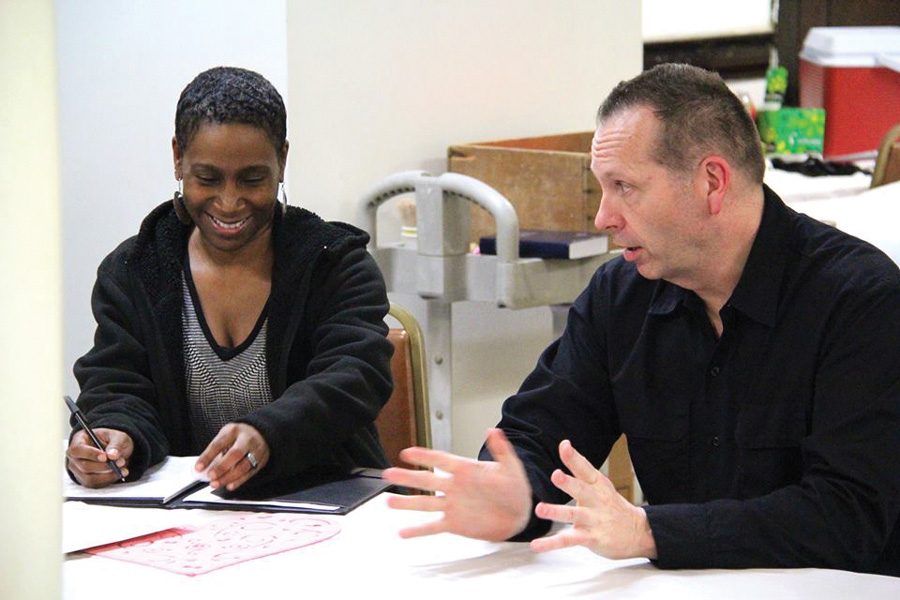Feinberg faculty member brings psychology background into playwriting
Shariba Rivers (left) and a cast member rehearse for “Skin for Skin.” The play, written by Feinberg psychologist Paul Pasulka, opens Saturday at the Rivendell Theatre in Chicago.
March 2, 2017
As a clinical psychologist, Paul Pasulka (Feinberg ’83, ’85) has spent much of his life surrounded by other people’s stories. He works with conflict, emotion, language and humanity on a daily basis.
As a playwright, he does the same.
Pasulka, who teaches at the Feinberg School of Medicine, has been working in psychology for nearly 50 years. After stumbling upon the Chicago Dramatists school about eight years ago, he developed an interest in theater and has since written 11 full-length plays.
An adaptation of Pasulka’s play, titled “Skin for Skin,” opens Saturday at the Rivendell Theatre in Chicago. The play’s main character, Ayyub, is an Iraqi-American businessman and devout Muslim who is imprisoned and tortured by the U.S. military in a prison reminiscent of the infamously violent conditions of Abu Ghraib.
“Skin for Skin” follows the biblical and Quranic narrative of Job, a wealthy man whose faith is tested when his possessions and loved ones are stripped away from him. Ayyub, whose name is the Arabic equivalent of Job, similarly loses everything as he is imprisoned and tortured by a military that acts as an “ignorant God,” Pasulka said.
“Why do bad things happen to good people?” Pasulka said. “That is the philosophical question that was generated with the book of Job.”
Though the protagonist is from Iraq, he grew up in the United States, said Steve Silver, who plays Ayyub. Because of this, Silver said Ayyub feels betrayed when he is suddenly imprisoned and tortured.
Because Silver is neither Arab American nor Muslim, he said he did a lot of research to portray the character accurately and respectfully. Silver said a consultant helped teach him and other cast members about how to properly handle the Quran and represent Muslim prayer.
Though the story is set in 2003, director Michael Menendian said it still feels relevant, referencing President Donald Trump’s expressed support of “enhanced interrogation” techniques like waterboarding.
Menendian said he and his team made stylistic choices such as using slow-motion or vocal reactions to be able to represent torture onstage without actually engaging in the acts. He said he thinks the play has a strong message against torture even though those scenes may be less visceral than actual footage.
Even so, Pasulka emphasized that the play is more than just non-stop brutality. The play is political but is most importantly about humanity and does not portray the interrogators as clear villains, he said.
Pasulka said he believes his work in psychology has given him an understanding of this type of emotional nuance. Though he never directly references clients’ stories, he said he draws on his experience to create characters and dialogue that are realistic.
Shariba Rivers, who plays psychologist Dr. O’Brien, said she finds all of the play’s characters to be sympathetic to some degree. Though she disagrees with her character’s choices, she said she is able to empathize with her struggles, and thinks the audience will be able to do the same.
Rivers added that she wants the play to spark dialogue above all else.
“I don’t think this play answers the question; I think this play poses the question,” Rivers said. “What would you do? What should we do? Where do we go from here?”
Email: madelineburakoff2020@u.northwestern.edu
Twitter: @madsburk


